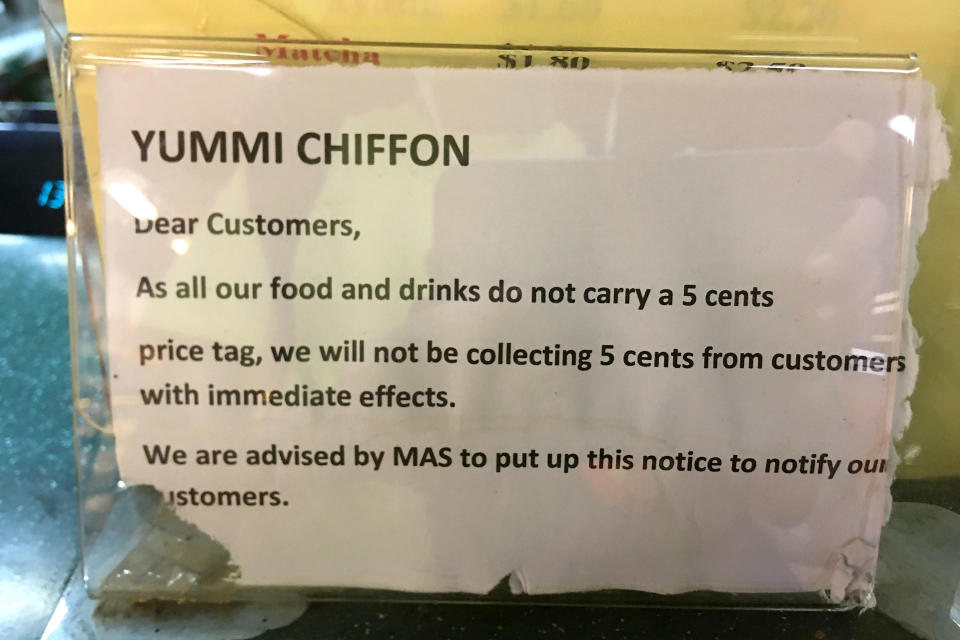Shops can opt to refuse 5-cent payment due to little-known rule

By Isabelle Liew
SINGAPORE — Sandra Lim works at a bakery in Tanjong Pagar Plaza and often gets into arguments with some customers over payment, specifically 5-cent coins.
Despite having a sign placed at Chocolat N’ Spice since 2010 to indicate that the bakery doesn’t accept 5-cent coins, it still gets about 20 5-cent coins a week from customers who refuse to back down.
“Some still try to pay up to $1 in five-cent coins. They are sarcastic and get frustrated, and some even scold me,” said Lim, 35, who usually swops out the coins with her own large denomination coins and then tries to use them elsewhere.
But the bakery has the right to reject 5-cent payment from customers so long as it puts up the sign, as stated in the Currency Act. The Monetary Authority of Singapore (MAS) has written a few letters over the years to local media to address the issue by citing the Act, in response to irate customers who questioned certain shops that had rejected their payments.
Under the Act, while currency notes and coins issued by the authorities are legal tender, a payee can choose to put up a “written notice to the payer that he would not accept as payment all or any of the denominations of currency notes or coins in satisfaction of a debt”.

Similarly, at Yummi Chiffon, a shop selling hot beverages and cakes at Tanjong Pagar Xchange, altercations with insistent customers happen daily despite a clear sign stating that it does not accept 5-cent coins, said Serene Chng, 53, who has worked there for two years.
She makes exceptions for two coins per customer, but many want to use more, and insist that the store is obliged to accept them. “If customers give six 5-cent coins, my boss will tell me not to accept. Some customers don’t understand and try to argue with us.”
The main reason for the reluctance of shops like Yummi and Chocolat N’ Spice to accept 5-cent coins is the service fee charged by banks for depositing coins – usually $0.015 per coin. That takes more of a dent out of a 5-cent coin compared to, say, a $1 coin.
Earlier this year, the Currency Amendment Bill moved to simplify tender limits, imposing a 20-coin maximum per denomination instead of the previous value limit.
In other words, a buyer can use up to 20 coins for each of the 5-cent, 10-cent, 20-cent, 50-cent and $1 denominations, or a maximum $37. This works out to $1.50 in the service fee to be incurred by a shop that accepts the transaction.
The idea of a cap on service charges was brought up in Parliament earlier this year by Bishan-Toa Payoh GRC Member of Parliament Saktiandi Supaat. However, MAS’ position is that these are commercial decisions by banks. There are only a few exceptions made by banks, including free deposits of up to 1,000 coins a month into a POSBkids account, or deposits into a child’s Child Development Account at POSB, OCBC or UOB.
For some shops, the arguments and held-up queues over their refusal to accept 5-cent payments have prompted them to do an about-turn, such as one popular snack retailer in the Orchard area.
“While regular customers understand, many other customers make a big fuss out of it and take photos of the stall, threatening to post (them) online,” said its spokesman, who requested that the shop not be named.
A number of shops – usually smaller food stalls and mom-and-pop establishments – have often found themselves in the spotlight when customers take to social media platforms to express their ire when coins are rejected.
Housewife Melinda S, 50, who has accumulated $180 in 5-cent coins in piggy banks, use them for several rounds of groceries at the self-checkout kiosks at an NTUC Fairprice outlet near her home. Several stores near her Toa Payoh home either reject large numbers of 5-cent coins, or make a fuss.
There is no limit for the number of coins – in any denomination – that can be used in NTUC Fairprice’s iCash system in 38 stores, an automated cash-payment machine at cashier-manned checkout rows, or in about 300 of the 600 self-checkout counters it has in 100 stores.
“The coins are inconvenient to lug around but it’s still money, and it’s great to find convenient ways to use them,” Melinda said.
Other Singapore stories
Deliveroo unveils plans for its riders to get e-scooter trade-in grants
Steakhouses in Singapore: Where to find Great Steaks in Singapore
Singapore tycoons team up to vie for digital banking licence


